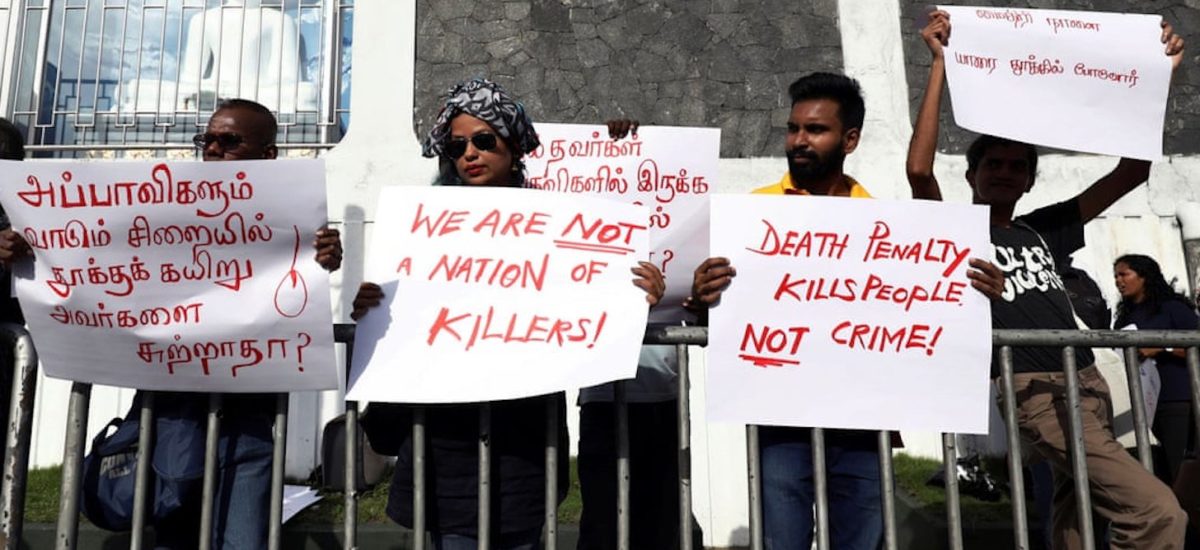Photo courtesy of The Guardian
In 2018 the former President of Sri Lanka, influenced by Philippine President Rodrigo Duterte’s ‘war on drugs’ policy, attempted to resume executions for people convicted of drug trafficking. The President’s move reignited the debate on capital punishment. Although the Supreme Court issued an interim injunction preventing resumption, calls to resume executions have since been frequently used by successive politicians for electoral purposes.
Historically public opinion, or what is perceived to be public opinion, has influenced criminal justice policy in Sri Lanka on numerous occasions. For instance, as the report of the National Study of Prisons conducted by the Human Rights Commission states, in 1999, in response to a public outcry against persons being released from prison ‘too early’, President Chandrika Bandaranaike Kumaratunga suspended the commutation of death sentences to life imprisonment and limited the number of days that incarcerated persons received pardons. These changes disrupted a system of periodic evaluation of their sentences against their behaviour to avoid long term incarceration.
Public opinion can therefore have a direct influence on criminal policy and politicians often introduce harsh punishments claiming merely to reflect public opinion. However, research on public opinion on penal policy has shown that while politicians assume the public to be punitive the public, on the contrary, often stresses more reform-orientated and less punitive goals.
We set out to test the level of support for the death penalty in Sri Lanka. In particular, we explored to what extent the public endorsed the ‘war on drugs’ rhetoric, testing the public appetite to sentence drug-related offenders to death. We posted a Twitter poll during 1 to 8 July 2021 asking the public to respond to questions on the death penalty. The number of responses ranged between 152 and 170 depending on the question posed. We make no claims that the results of the Twitter poll are representative of the public, and further research is necessary to confirm our hypothesis. Bearing in mind this caveat, our poll confirmed the US finding and showed a striking lack of correspondence between the public will and politicians’ perception of that will.
We used a scenario-based question to gauge public sentencing preference for drug possession:
Chethana got married when she was 15. Her drug-dependent husband forced her into sex work to fund his drug habit. She became addicted to heroin and was charged with possession of 2.5 grams of heroin.
In Sri Lanka, the possession of heroin above two grams is a capital offence, which means the court has the discretion to sentence Chethana to death. Chethana’s circumstances of domestic abuse and drug dependency have been commonly found amongst women in prison for drug-related offences. The majority of respondents (79%) did not think Chethana should be punished. Among the remaining minority of respondents who thought Chethana should be punished, only four per cent thought that Chethana deserved a death sentence. An overwhelming majority thought she should receive a community sentence.
In addition, respondents did not see the death penalty as a solution to the country’s drug problems. The majority of respondents (79%) disagreed with the statement ‘in Sri Lanka, drug problems can be solved by the resumption of executions.’ In addition, when respondents were asked to choose the ‘most effective policy’ to solve drug problems, ‘resuming executions’ was perceived to be the least effective policy (7%); the most popular response was ‘treat [drug problems] as a health issue’ (40%), followed by ‘target supply of drugs’ (35%), and ‘decriminalise personal drug use’ (18%). These results strongly suggest that the call to resume executions for drug-related offences, if implemented, would be at odds with public opinion.
Our results clearly suggest that the respondents are not only rejecting the use of the death penalty for drug-related offences but also for at least some categories of homicide, as the following scenario-based question demonstrates.
Nimal’s income depends on his two cows. He found one cow bleeding with a broken toddy pot. A drunk man claimed that a cow broke his pot and threatened Nimal with a knife saying ‘I will cut you like I cut your cow.’ Nimal stabbed and killed the man during a struggle.
In Sri Lanka, the mandatory death penalty applies to murder. If Nimal were to be convicted of murder, the court must sentence him to death. Again, Nimal’s case of a poor man resorting to violence due to poverty is common among persons on death row as illustrated by the National Study of Prisons. While the majority of respondents considered Nimal should be punished, only 5 per cent of respondents thought that the death penalty was the appropriate punishment.
Indeed, our results show that the respondents are ready to abolish the death penalty altogether, with 76 per cent of respondents taking the position that the death penalty should be abolished in law. The majority of respondents also do not see the death penalty as a deterrent to crime: 70 per cent of respondents considered the abolition of the death penalty having no impact on crime rates. After 45 years without an execution, the death penalty appears to be no longer about law and order and seems to have become a reputational issue, with 60 per cent of respondents believing that the retention of the death penalty harms Sri Lanka’s international reputation.
Even though the last execution took place in 1976, the courts continue to hand down death sentences every year. As long as the death penalty remains a lawful punishment, the possibility of an execution is a reality for the 1,284 persons on death row (as of September 2020). In addition, we must not forget that executions are not the only way the criminal justice system kills its detainees. Due to the increasing number of persons on death row, the detention conditions on death row have seriously deteriorated due to overcrowding, limited infrastructure and poor prison healthcare, leading to an increase in the number of deaths in custody without being judicially executed. Following the onset of the COVID-19 pandemic, persons in prisons have become even more vulnerable to the possibility of becoming seriously ill or dying in prison. The outbreak of COVID-19 in prisons since October 2020 has led to over 13,000 cases of infection and at least 21 deaths (as of August 2021). As Sri Lanka and the rest of the world struggle to manage the COVID-19 pandemic, an early release of persons in prisons becomes key to preventing and containing infections in prisons – an option unavailable to those on death row.
This was an exploratory piece of research. Our sample was small, self-selected and not representative of the Sri Lankan public overall. Nevertheless, the results are striking and, we think, important. In 2022, we will be undertaking a larger-scale in-depth survey with a fully representative sample of the Sri Lankan public.


